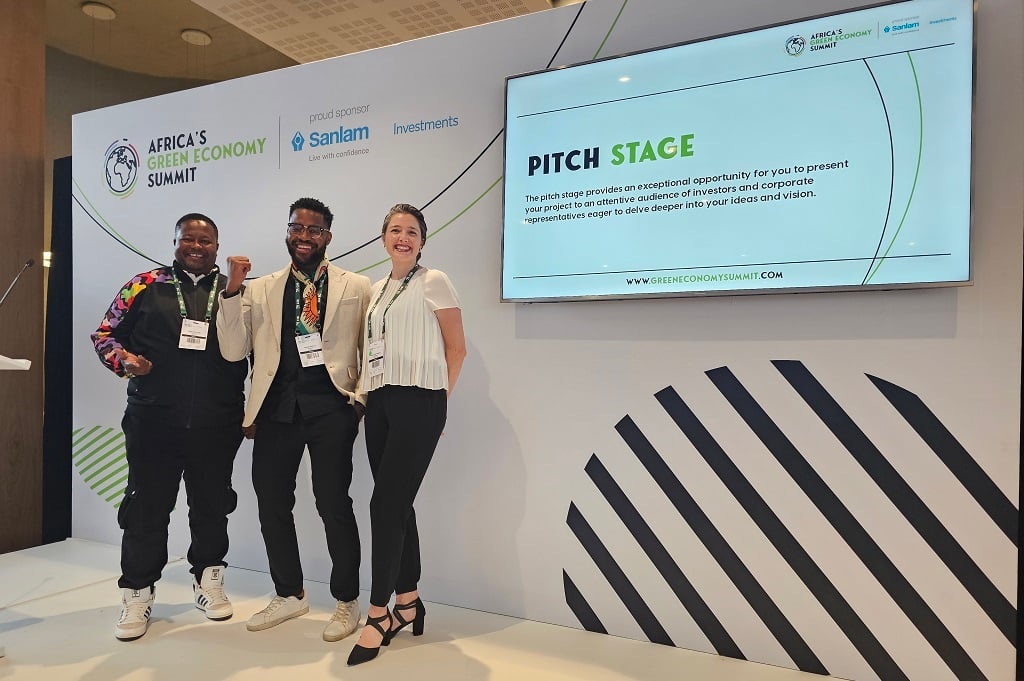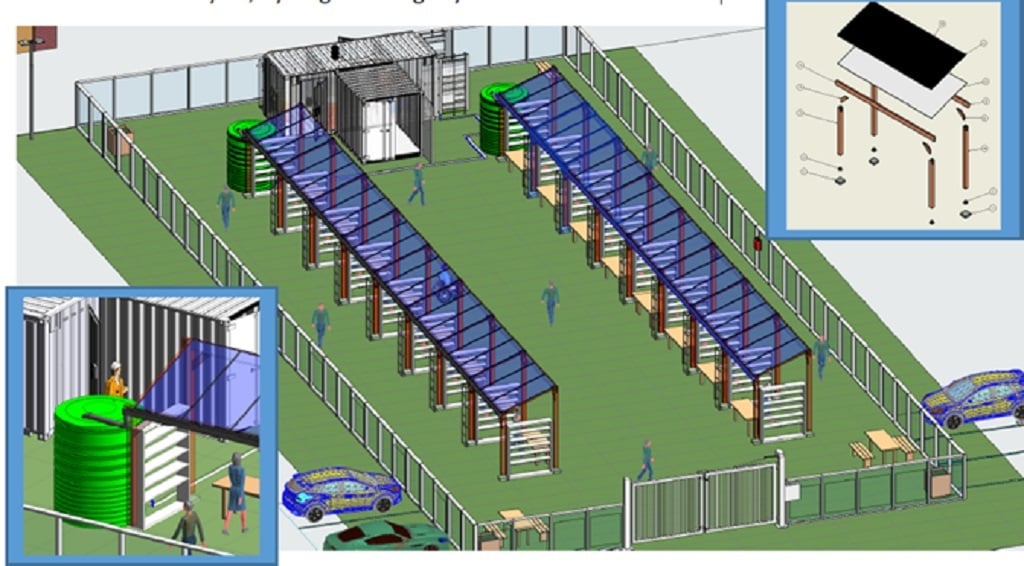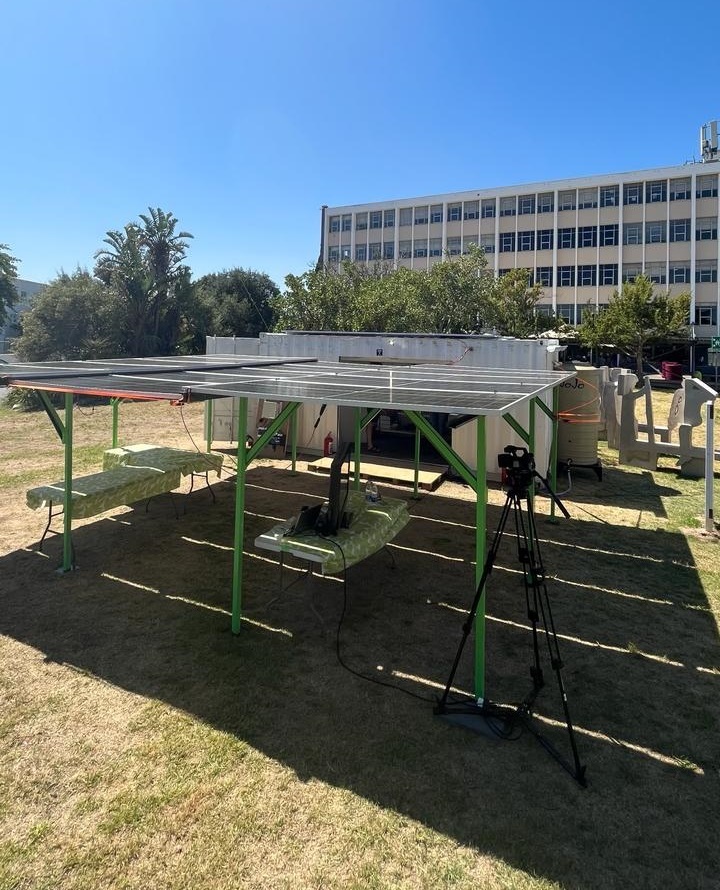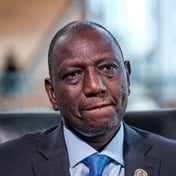
- A renewable energy startup founded by five UCT graduates is in the running to win an R18 million prize for their solution designed to help rural communities.
- By providing a reliable and sustainable source of electricity, they can also tackle other issues like energy shortages and the lack of clean water.
- Finalists have already earned about R1.4 million to invest in their solutions, as well as networking opportunities and a course with Stanford.
- For climate change news and analysis, go to News24 Climate Future.
Omnivat, a renewable energy startup founded by five University of Cape Town (UCT) graduates, is in the running to win an R18 million prize for its solution to tackle energy shortages and lack of clean water in rural communities.
The startup also has ties to Tanzania and the Democratic Republic of Congo (DRC) and uses a combination of solar panels, batteries, and hydrogen – all pre-packaged in a shipping container – to provide reliable power to users, even when the sun isn't shining.
Randy Kabuya, a young engineer from the DRC and the founder of Omnivat, said: "There is a saying that goes 'If you want to go fast, go alone. If you want to go far, go together.' When I saw the Milken-Motsepe competition, I quickly gathered my friends whom I met at tertiary and told them we had to partake in the competition."
The Milken-Motsepe Prize in Green Energy established last year, seeks to give innovators a chance to scale up their solutions for reliable, affordable, and sustainable electricity in Africa.
It is a collaboration between the Milken Institute - a nonprofit think tank based in Santa Monica, California, with six other global offices - and the Motsepe Foundation, a South African nonprofit founded by businessman Patrice Motsepe and his wife, Precious Moloi-Motsepe which is dedicated to tackling poverty, unemployment, and inequality.
The UCT graduates have already received R1.4 million for being among the top five finalists of the competition. If they win, they could receive $1 million or R18 million.
"The R18 million prize would provide a major boost to our efforts to scale up our operations and bring our solution to more communities in need," Kabuya said.
Kabuya, an electro-mechanical engineer and product developer, is responsible for system design and development at Omnivat. He and his team of engineers, who met while studying at UCT, proudly define themselves as a pan-African team.
"The circumstances of my surroundings motivated me to create a solution that would benefit my community and beyond," Kabuya said. "With our innovative approach to solar power and hybrid battery and hydrogen storage, Omnivat has the potential to make a significant impact in rural areas where access to reliable energy is limited," he added.
READ | This 'weird' toilet paper is 'solving SA's problems one wipe at a time'
Deney van Rooyen, co-founder of Omnivat and a civil engineer, described it as a green market solution which uses solar panels to create a shaded marketplace in rural or peri-urban communities.
"It basically creates a shaded marketplace using solar panels as roofs under which vendors can trade. That solar power then goes into our containerised system where the solar energy is stored in second-life batteries," said Van Rooyen.
Second-life batteries are repurposed, having not yet reached the end of their operational life.
"What we've been very intentional about doing is using second-life batteries, we figured there's a lot of battery waste that's starting to happen as electric vehicles from your first-world countries reach the end of their warranties. And so, there are several organisations that repurpose second-life batteries so that they can be used for different applications… So, we are now using them to store energy," Van Rooyen explained.
If the batteries run out, typically on cloudy days or during the rainy season, there is a secondary storage system that makes use of hydrogen, which kicks in.
"The market also harvests rainwater, which our system purifies," said Van Rooyen. The system uses an electrolyser to split the water into hydrogen and oxygen and then store the hydrogen for when it is needed- specifically for use by a fuel cell that will generate additional electricity when the sun isn't shining.
Van Rooyen explained that Omnivat's solution addresses energy access challenges not only in South Africa but across the African continent. By providing a reliable and sustainable source of electricity and purifying water, their solution helps tackle issues such as electricity shortages, lack of clean water, and limited economic opportunities.
However, the team faced several challenges in developing their initial demo to full scale under a tight deadline. They also had to import some of the major equipment that was not available in South Africa.
"One of the big challenges we faced was importing some of the major equipment that is simply not available in South Africa. For instance, we had to import electrolysers from Italy and fuel cells from the Netherlands," Van Rooyen said.
"Imports are a big challenge, particularly because we're buying one or two of something. Once we start scaling and building multiple green markets at a time, the costs will be more manageable," she added.
Van Rooyen expressed her desire to see more local manufacturing of the necessary equipment for their energy solution:
Sifiso Mvulane, the team's electro-mechanical engineer and who is also responsible for the system design and assembly, expressed excitement about the opportunities that the competition has provided for Omnivat. "The Milken-Motsepe Prize contestants have had the opportunity to connect with world-class experts in innovation and entrepreneurship, as well as a global network of investors who provided guidance and support.
"Additionally, the finalists attended a Stanford course called 'Idea To Market', facilitated by Global Innovation Catalyst, and received mentorship to help shape their ideas and businesses," he said.
Dr Emily Musil-Church, senior director at the Milken Institute, said that contestants gain non-monetary benefits from participating in the competition too. "Even if somebody didn't win the prize, they felt like it was worth investing all their time and energy. Even if one didn't make it to the next round, they have hopefully gained resources that they didn't have before," she said.
Omnivat, along with other green energy finalists, demonstrated their solutions at Stellenbosch University in February as part of a requirement of the competition that all innovations be tested on the African continent.
The teams had to generate 60kWh of electricity in a 24-hour period – demonstrating the use of an off-grid electricity solution using green energy sources that can also provide affordable and reliable electricity to poor communities.
The other finalists include:
- AfTrak Micro Electric Agriculture and Energy – a solution that uses solar microgrids and solar-powered tractors for deep-bed farming;
- GEG ehf – a solar and geothermal-powered hybrid renewable energy system solution;
- New Digit Technologies – a solution that offers a compact and portable device that generates energy and purifies water;
- Smart Agri-Centres – a solution providing solar-powered community hubs providing affordable clean energy and services to farmers.
The final competition awards will be announced at the Milken Institute Global Conference held in Los Angeles, in May. Each team will be able to send up to two representatives to the conference.




 Publications
Publications
 Partners
Partners














